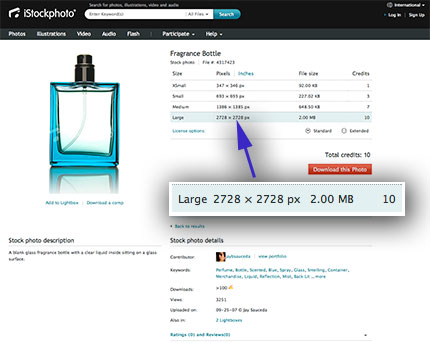Here's a photo, on the iStockphoto website (here) of a nondescript fragrance bottle. Price? About $10.

Where can you buy this exact same photo, with the exact same resolution, for $340?
Why, iStockphoto parent company, Getty Images, right here via their Getty Images Flickr site!

So, Getty is doing a pretty good job of self-immolation. This isn't the first time, nor will it be the last, that Getty Images makes mistakes that cost them their bottom line!
(via Shannon Fagan on Facebook)
Please post your comments by clicking the link below. If you've got questions, please pose them in our Photo Business Forum Flickr Group Discussion Threads.
Shawn -
ReplyDeleteThere's a bit of confusion on that. In the end, the dimensions (in pixels) are what (for the most part) defines the size of the file. If you look at the Getty one, it's 1.3GB, which just shows up as 2.0GB on the iStockphoto site. A 1.36GB file (and a 2.0GB file for that matter) is the size of the JPEG, and opens up to be a 21MB file, as it shows on the Getty site. They are the same pixel dimensions.
- John
Weird. Only thing I can think of is that they are assuming that someone might be tempted to "borrow" for another use, such as a web thing, and are taking that into account.
ReplyDeleteDo any "outsiders" know if privatized Getty owners are operating well into the black, whether they are under pressure to sell as whole or break up & sell? What their stock photo strategy changes are going forward?
ReplyDeleteJohn -
ReplyDeleteThat's bit about resolution and file sizes is untrue.
When you open an image in photoshop, The memory listed in the bottom left corner of the image is the amount of RAM being used for that image, NOT the actual size of the file. I'm not sure what you mean by 'uncompressed' JPEG
File Size for images is determined by pixel dimensions (Length x Width) and resolution (DPI).
What I'm guessing is going on here, is that iStockphoto is hosting the image at 72 DPI which is fine for web work, but not fine for print work. Getty has the same file available at 300 DPI, which would be fine for print work and thus justifies the higher cost.
I see it the other way around.
ReplyDeleteThe pricing is intentionally designed in this manner to obtain extra income from "stupid" people on the buying side.
The market value of this image is $10. Istock sells it at that price and makes a fair, but small, profit on the transaction.
Getty also sells it at $340. If a "stupid" and/or price insensitive buyer comes along then they get extra revenue. If not, they still have the image for sale on their sister site at it's fair value...$10.
Pardon the GB/MD error. I should have said:
ReplyDeleteIf you look at the Getty one, it's 1.3mb, which just shows up as 2.0mb on the iStockphoto site. A 1.36mb file (and a 2.0mb file for that matter) is the size of the JPEG, and opens up to be a 21MB file, as it shows on the Getty site.
Regards - John